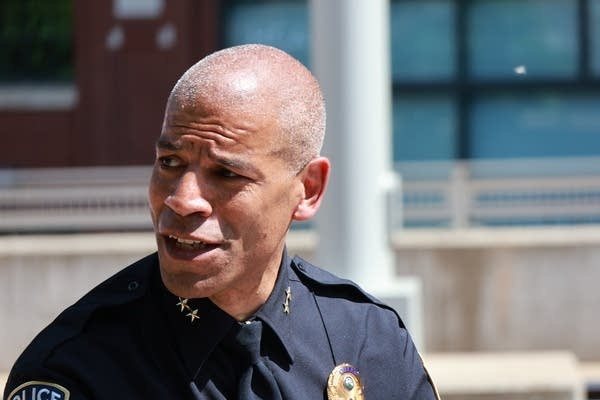Metro Transit police chief promises safety improvements

Go Deeper.
Create an account or log in to save stories.
Like this?
Thanks for liking this story! We have added it to a list of your favorite stories.
Metro Transit officials are promising to tackle crime and other safety problems on the Twin Cities’ public transit system. The number of people riding buses and trains continues to slowly tick upward after a steep drop at the start of the pandemic. But reports of vandalism, drug use and assaults are up sharply.
Lisa Tabor is a regular, if occasional user of the region’s public transit system. She takes the light rail about once every month or so to travel from her home in Minneapolis to MSP airport for business trips.
As she awaited the Blue Line train around noon Thursday at Target Field Station, Tabor said she often sees fellow riders who appear to be homeless, but they generally keep to themselves. Despite a significant rise in crime in recent years, Tabor said she’s never felt unsafe on the train, which she typically rides early in the morning or around midday.
“I haven’t really seen any crime other than one person [where] I witnessed the police interacting with them because they failed to buy a ticket, and it was quite a respectful interaction. I was very pleased,” Tabor said.
Turn Up Your Support
MPR News helps you turn down the noise and build shared understanding. Turn up your support for this public resource and keep trusted journalism accessible to all.
Metro Transit statistics show that crime rose 66 percent in the first three months of 2023 compared with the same time last year. Vandalism remains a major problem, as do assault, theft, and weapons offenses. At the same time, ridership is nearly half of what it was in 2019.
Tabor caught her afternoon train just after Metro Transit leaders wrapped up a news conference where they promised to solve those problems and make other riders’ experiences as positive as Tabor’s have been.

The agency’s Police Chief Ernest Morales, who came to the Twin Cities from New York in February, said the effort starts with an increased presence of officers and security personnel.
“We’re going to look to enforce the code of conduct,” Morales said. “When we see a violation taking place, we are going to immediately enforce it. But it has to be based on observations, and within the law.”
He said that includes continued support for Metro Transit’s Homeless Action Team, which directs people to shelters and other services.
The transportation bill that Gov. Tim Walz signed last week allows non-police officers to issue administrative citations to riders who don’t buy tickets. Previously, only police could enforce fares through misdemeanor citations that were rarely prosecuted. Morales said he hopes to hire 26 transit safety ambassadors.
In March, the Metropolitan Council, which oversees the transit system, approved a two-year, $6 million contract with Allied Universal Security to provide a presence at a half dozen trouble spots. Those include Lake Street Station in Minneapolis, where two men assaulted a transgender woman in February, and Central Station in downtown St. Paul, the site of a double homicide in December.
State lawmakers also directed $2 million for nonprofits to provide social service outreach on buses and trains for the next year. Hortense Hollie with A Mother’s Love said that’s something her group has already started. Hollie said misbehavior in public spaces is often the result of deeper problems, including poverty.

“You’re acting out because there’s something that you need,” Hollie said. “And when we get those referrals, we return them to our office, they get a call within 24 to 48 hours to set them up with services, empowerment groups, whatever service they may need if it’s treatment, a job, anything like that. So that’s our presence on the bus, it’s the soft touch, the community touch.”
Metro Transit plans to hire other community groups to supplement the work of A Mother’s Love. Chief Morales said he’s hopeful that a better experience for everyone will encourage more people to return to the region’s buses and trains, leading to a virtuous cycle of safety in numbers.



